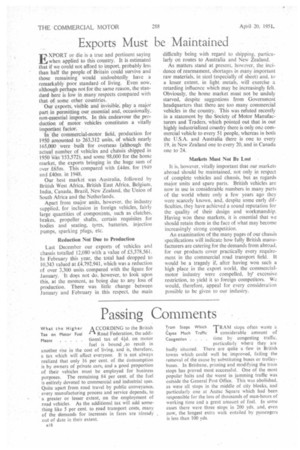Exports Must be Maintained
Page 52

If you've noticed an error in this article please click here to report it so we can fix it.
EXPORT or die is a true and pertinent saying when applied to this country. It is estimated that if we could not afford to import, probably less than half the people of Britain could survive and those remaining would undoubtedly have a remarkably poor standard of living. Even now, although perhaps not for the same reason, the standard here is low in ,many respects compared with that of some other countries.
Our exports, visible and invisible, play a major part in permitting our essential and, occasionally, non-essential imports. In this endeavour the production of motor vehicles constitutes a vitally mportan t factor. In the commercial-motor field, production for 1950 amounted to 263,312 units, of which nearly 165,000 were built for overseas (although the actual number of vehicles and chassis shipped in 1950 was 153,572), and some 98.000 for the home market, the exports bringing in the huge sum of over £65m. This compared with £44m. for 1949 and £40m. in 1948.
Our best market was Australia, followed by British West Africa, British East Africa, Belgium. India, Canada, Brazil, New Zealand, the Union of South Africa and the Netherlands.
Apart from major units, however, the industry supplied, for inclusion in foreign vehicles, fairly large quantities of components, such as clutches, brakes, propeller shafts, certain requisites for bodies and seating, tyres, batteries, injection pumps, sparking plugs, etc.
Reduction Not Due to Production Last December our exports of vehicles and chassis totalled 12,080 with a value of £5,378,561. In February this year, the total had dropped to 10,343 valued at £4,792,941, which was a reduction of over 3,300 units compared with the figure for January. It does not do, however, to look upon this, at the moment, as being due to any loss of production. There was little change between January and February in this respect, the main difficulty being with regard to shipping, particularly on routes to Australia and New Zealand.
As matters stand at present, however, the incidence of rearmament, shortages in many important raw materials, in steel (especially of sheet) and, to a lesser extent, in light metals, will exercise a retarding influence which may be increasingly felt. Obviously, the home market must not be unduly starved, despite suggestions from Government headquarters that thereare too many commercial vehicles in the country. This was refuted recently in a statement by the Society of Motor Manufacturers and Traders, 'which pointed out that in out highly industrialized country there is only one commercial vehicle to every 51 people, whereas in both the U.S.A. and Australia there is one to every 19, in New Zealand one to every 20, and in Canada one to 24.
Markets Must Not Be Lost It is, however, vitally important that our markets abroad should be maintained, not only in respect of complete vehicles and chassis, but as regards major units and spare parts. British vehicles are now in use in considerable numbers in many parts of the world where only a few years ago they were scarcely known, and, despite some early difficulties, they have achieved a sound reputation for the quality of their design and workmanship. Having won these markets, it is essential that we should retain them in the face of what may become increasingly strong competition.
An examination of the many pages of our chassis specifications will indicate how fully British manufacturers are catering for the demands from abroad, for our products cover practically every requirement in the commercial road transport field. It would be a tragedy if, after having won such a high place in the export world, the commercialmotor industry were compelled, bf excessive restriction, to yield it to foreign competitors. We would, therefore, appeal for every .consideration possible to be given to our industry.








































































































































































































